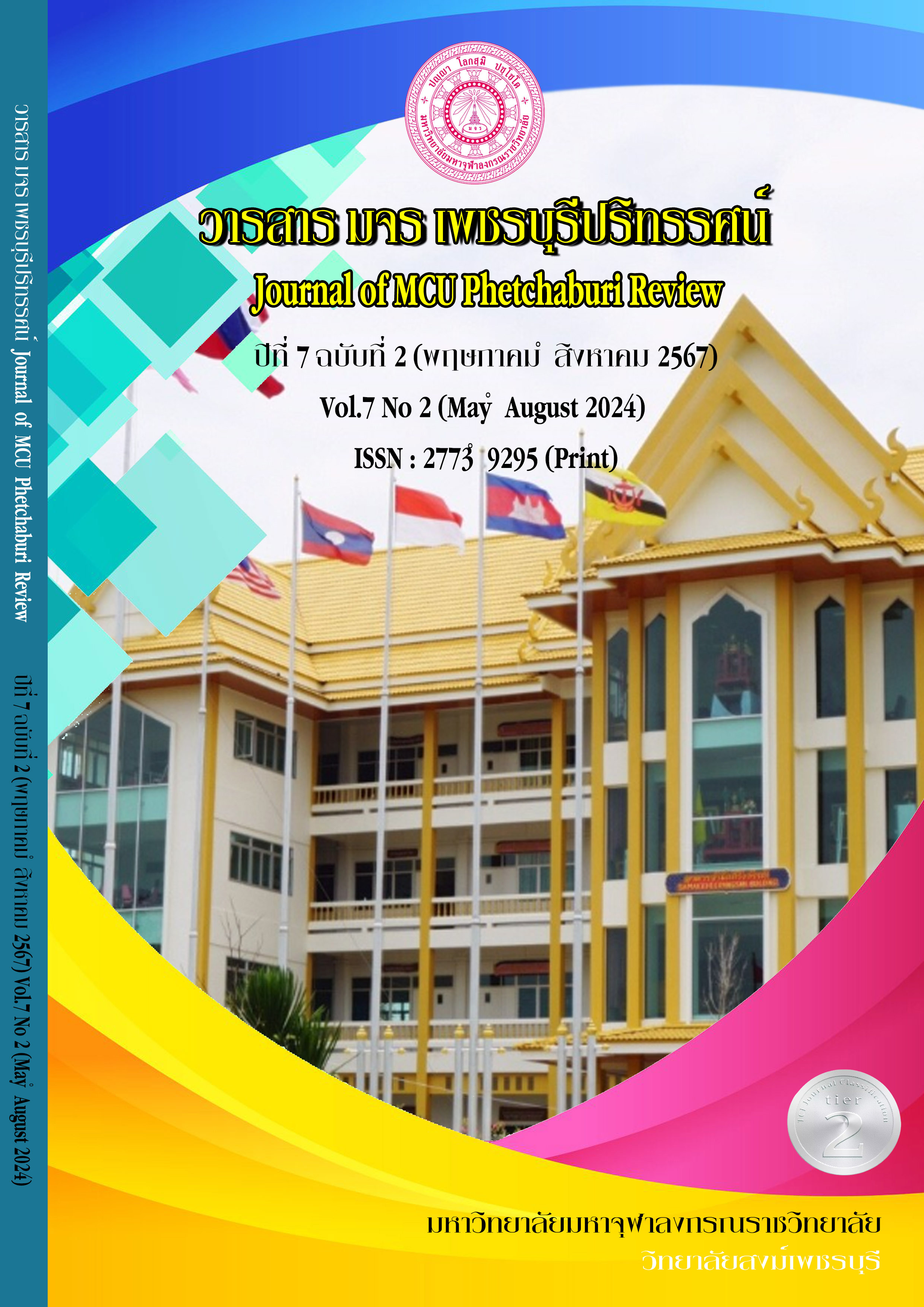แนวทางการส่งเสริมศักยภาพคนไร้ที่พึ่ง เพื่อการพัฒนาผลิตภัณฑ์ในสถานคุ้มครองคนไร้ที่พึ่งกุ่มสะแก จังหวัดเพชรบุรี
Main Article Content
Abstract
The research aims to: The objectives of this research were to study: 1) the potential promotion of the destitute and develop the products in Kumsakae Home for the Destitute, Phetchaburi Province, 2) the relationship between potential promotion of the destitute and product development in Kumsakae Home for the Destitute, Phetchaburi Province, and 3) the guidelines for promoting the potential of the destitute for product development in Kumsakae Home for the Destitute, Phetchaburi Province. The mixed research methodology was applied in this study. The population used in the research consisted of 217 destitute people in Kumsakae Home for the Destitute, Phetchaburi Province. The data were analyzed by using frequency, percentage, mean, standard deviation, and Pearson’s Correlation Coefficient. The qualitative data were collected by using in-depth interviews from 9 key informants, selected by using purposive sampling method from the heads of welfare departments, handicraft professional trainers, social workers, psychologists, the caregivers for male and female welfare recipients. The data were analyzed by using content analysis. 1) Promoting the potential of the homeless and product development in the Kum Sakae. 2)There was overall a positive relationship between potential promotion of the destitute and product development in Kumsakae Home for the Destitute, Phetchaburi Province, at a high level (r=0.710), and the relationship of each aspect was between 0.270 and 0.623, with 3) The guidelines for promoting the potential of the destitute for product development were that there should be activities or training to provide knowledge and increase skills in various areas, such as training for those with existing skills to become proficient, that the training for those without skills should start practicing simple skills, and that the networks should be used for training and providing knowledge in various areas for better product development.
Article Details

This work is licensed under a Creative Commons Attribution-NonCommercial-NoDerivatives 4.0 International License.
References
กรมพัฒนาสังคมและสวัสดิการ. (2565). การพัฒนาศักยภาพและเสริมสร้างคุณภาพชีวิต. กรุงเทพมหานคร : กระทรวงการพัฒนาสังคมและความมั่นคงของมนุษย์.
กระทรวงการพัฒนาสังคมและความมั่นคงของมนุษย์. (2559). ความหลากหลายของโลกในสถานการณ์ยุคปัจจุบัน. กรุงเทพมหานคร.
จิรกิตติ์ เนาวพงศ์รัตน์. (2562). ผลการจัดการเรียนรู้พลศึกษาตามแนวคิดการเรียนรู้เชิงรุกที่มีต่อผลสัมฤทธิ์ทางการเรียนและความสามารถในการแก้ปัญหาของนักเรียนมัธยมศึกษาปีที่ 2. วิทยานิพนธ์ปริญญามหาบัณฑิต (สุขศึกษาและพลศึกษา), จุฬาลงกรณ์มหาวิทยาลัย.
ชูชัย สมิทธิไกร. (2553). พฤติกรรมผู้บริโภค. กรุงเทพมหานคร: วีพริ้นท์.
ทิพากรณ์ หน่อแก้วบุญ. (2559). การพัฒนาระบบการเรียนการสอนตามแบบยูเลิร์นนิ่งเพื่ออาชีวศึกษาและการฝึกอาชีพ. ปรัชญาดุษฎีบัณฑิต สาขาวิชาเทคโนโลยีเทคนิคศึกษา ภาควิชาครุศาสตร์เทคโนโลยีบัณฑิตวิทยาลัย มหาวิทยาลัยเทคโนโลยีพระจอมเกล้าพระนครเหนือ.
นิตยา เต็งประเสริฐ. (2557). การพัฒนารูปแบบการจัดการเรียนรู้โดยการผสมผสานทักษะปฏิบัติเดวีส์และการเรียนรู้แบบร่วมมือ เพื่อพัฒนาทักษะปฏิบัติชุดระบำไก่วิชาดนตรี-นาฏศิลป์. หลักสูตรศึกษาศาสตรมหาบัณฑิต สาขาวิชาเทคโนโลยีการวิจัยและพัฒนาหลักสูตรคณะครุศาสตร์อุตสาหกรรม มหาวิทยาลัยเทคโนโลยีราชมงคลธัญบุรีจังหวัดปทุมธานี.
ไพศาล วรคำ. (2552). การวิจัยการศึกษา.กาฬสินธุ์ : คณะครุศาสตร์ มหาวิทยาลัยราชภัฏมหาสารคาม.ประสานการพิมพ์.
มัทนียา ค้อมทอง. (2552). ผลของการจัดกิจกรรมการศึกษานอกระบบโรงเรียนที่มีต่อความรู้ เจตคติ และทักษะอาชีพของกลุ่มสตรีชมรมแม่บ้านทหารอากาศ จังหวัดลพบุรี วิทยานิพนธ์ครุศาสตร์มหาบัณฑิต จุฬาลงกรณ์มหาวิทยาลัย. สำนักงานวิทยทรัพยากร.
วรรณี ลิมอักษร. (2551). จิตวิทยาการศึกษา. สงขลา: ศูนย์หนังสือมหาวิทยาลัยสงขลา.
อธิพงษ์ ฤทธิชัย. (2556). แนวคิดเรื่องสมรรถนะ.กรุงเทพมหานคร: ปัญญาชน.
อัจฉราพร ปะทิ. (2559). ความรู้ความเข้าใจและความคิดเห็นของประชาชนในชุมชนต่อการคุ้มครองคนไร้ที่พึ่ง: กรณีศึกษาประชาชนในตำบลผาสิงห์อำเภอเมืองจังหวัดน่าน. สังคมสงเคราะห์ศาสตรมหาบัณฑิต สาขาการบริหารและนโยบายสวัสดิการสังคม ภาควิชาสังคมสงเคราะห์ศาสตร์ คณะสังคมสงเคราะห์ศาสตร์ มหาวิทยาลัยธรรมศาสตร์.


